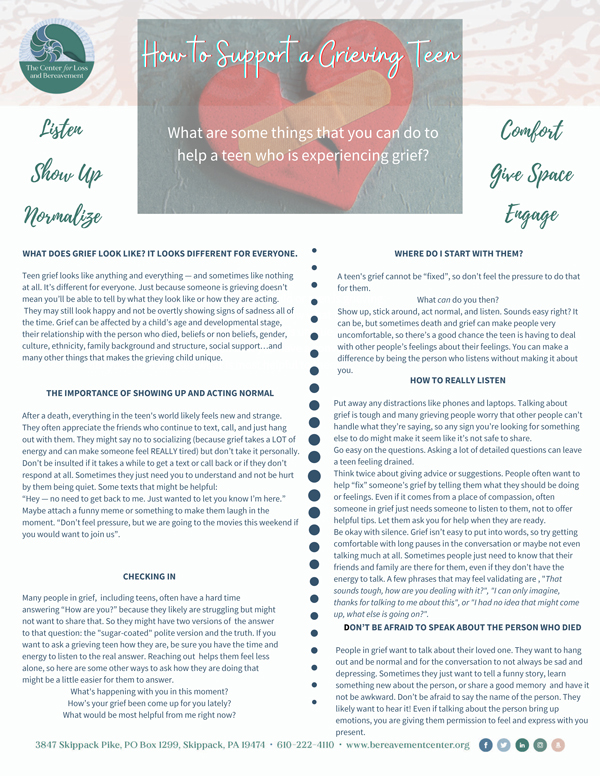CLB Tip Sheets
How to Support a Grieving Teen
What are some things that you can do to help a teen who is experiencing grief?
Listen | Show Up | Normalize
Give Space | Engage | Comfort
WHAT DOES GRIEF LOOK LIKE? IT LOOKS DIFFERENT FOR EVERYONE.
Teen grief looks like anything and everything — and sometimes like nothing at all. It’s different for everyone. Just because someone is grieving doesn’t mean you’ll be able to tell by what they look like or how they are acting. They may still look happy and not be overtly showing signs of sadness all of the time. Grief can be affected by a child’s age and developmental stage, their relationship with the person who died, beliefs or non beliefs, gender, culture, ethnicity, family background and structure, social support…and many other things that makes the grieving child unique.
THE IMPORTANCE OF SHOWING UP AND ACTING NORMAL
After a death, everything in the teen’s world likely feels new and strange. They often appreciate the friends who continue to text, call, and just hang out with them. They might say no to socializing (because grief takes a LOT of energy and can make someone feel REALLY tired) but don’t take it personally. Don’t be insulted if it takes a while to get a text or call back or if they don’t respond at all. Sometimes they just need you to understand and not be hurt by them being quiet. Some texts that might be helpful:
“Hey — no need to get back to me. Just wanted to let you know I’m here.”
Maybe attach a funny meme or something to make them laugh in the moment.
“Don’t feel pressure, but we are going to the movies this weekend if you would want to join us”.
CHECKING IN
Many people in grief, including teens, often have a hard time answering “How are you?” because they likely are struggling but might not want to share that. So they might have two versions of the answer to that question: the “sugar-coated” polite version and the truth. If you want to ask a grieving teen how they are, be sure you have the time and energy to listen to the real answer. Reaching out helps them feel less alone, so here are some other ways to ask how they are doing that might be a little easier for them to answer.
What’s happening with you in this moment?
How’s your grief been come up for you lately?
What would be most helpful from me right now?
WHERE DO I START WITH THEM?
A teen’s grief cannot be “fixed”, so don’t feel the pressure to do that for them.
What can do you then?
Show up, stick around, act normal, and listen. Sounds easy right? It can be, but sometimes death and grief can make people very uncomfortable, so there’s a good chance the teen is having to deal with other people’s feelings about their feelings. You can make a difference by being the person who listens without making it about you.
HOW TO REALLY LISTEN
Put away any distractions like phones and laptops. Talking about grief is tough and many grieving people worry that other people can’t handle what they’re saying, so any sign you’re looking for something else to do might make it seem like it’s not safe to share. Go easy on the questions. Asking a lot of detailed questions can leave a teen feeling drained. Think twice about giving advice or suggestions. People often want to help “fix” someone’s grief by telling them what they should be doing or feelings. Even if it comes from a place of compassion, often someone in grief just needs someone to listen to them, not to offer helpful tips. Let them ask you for help when they are ready. Be okay with silence. Grief isn’t easy to put into words, so try getting comfortable with long pauses in the conversation or maybe not even talking much at all. Sometimes people just need to know that their friends and family are there for them, even if they don’t have the energy to talk. A few phrases that may feel validating are, “That sounds tough, how are you dealing with it?”, “I can only imagine, thanks for talking to me about this”, or “I had no idea that might come up, what else is going on?”.
DON’T BE AFRAID TO SPEAK ABOUT THE PERSON WHO DIED
People in grief want to talk about their loved one. They want to hang out and be normal and for the conversation to not always be sad and depressing. Sometimes they just want to tell a funny story, learn something new about the person, or share a good memory and have it not be awkward. Don’t be afraid to say the name of the person. They likely want to hear it! Even if talking about the person bring up emotions, you are giving them permission to feel and express with you present.
Join Our
Mailing List
Donate
Today
Request
Information

Affiliations
• NACG
• CBEM Changemaker
• ADEC
• Charity Navigator
Quick Links
About Us
Individual & Family Grief Counseling
Volunteer
News
Grief Support Resources
Contact
Ph: 610-222-4110
Fax: 610-222-4116
3847 Skippack Pike
P.O. Box 1299
Skippack, PA 19474
Support The Center For
Loss and Bereavement
